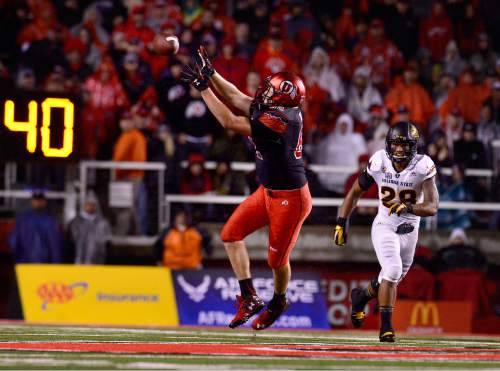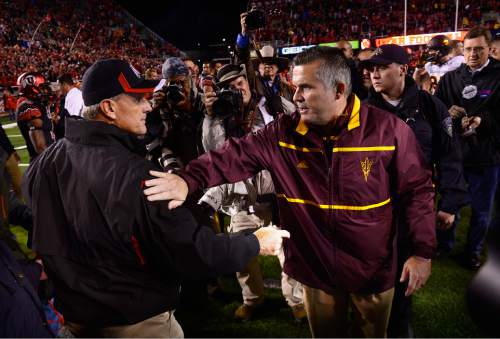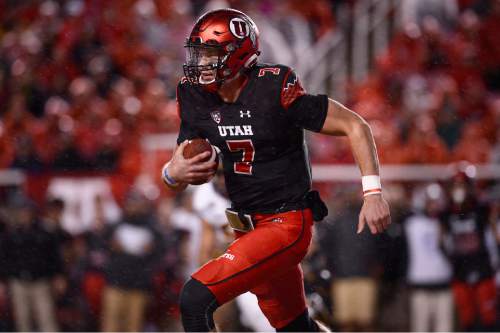This is an archived article that was published on sltrib.com in 2015, and information in the article may be outdated. It is provided only for personal research purposes and may not be reprinted.
The Utah offense isn't often in the huddle. Center Siaosi Aiono estimates it happens once a week in practice.
But sharp-eyed observers and fans noted that Utah went to the huddle almost the entire fourth quarter in a 34-18 win over Arizona State.
Why? Protection.
The Utes felt that the Sun Devils, through either scouting or in-game analysis, had determined some of Utah's offensive signals and were anticipating the play calls. So coaches decided to give the calls to Travis Wilson on the sideline and then huddle up.
And some may be surprised: Against Arizona State, offensive players said, it's nothing new. The offense installed some extra huddle practice this week for the Sun Devils.
"They called out a couple of our plays last year," Aiono said. "So it was like a tool in our tool bag to have just in case we had to pull it out, and it worked out for us."
Both Aiono and Wilson said they felt in the third quarter that ASU defenders knew what was coming. Wilson noted that some even were watching Utah's sideline to see what offensive coaches were signaling.
After these "suspicions and tips" that ASU had deciphered Utah's signals, the coaches decided to huddle. Utah managed 118 yards of offense and 20 unanswered points in the final quarter after churning out only 33 total yards and no points in the third.
"Specifically for this week, it was a game-plan thing," Aiono said. "It ended up winning the game for us."
Stealing signals is a somewhat ambiguous area: Some might call it cheating, some might call it gamesmanship. Utah coach Kyle Whittingham quipped that the Utes were tipped off something was amiss when they saw an ASU coach make a throwing motion before a pass, but said Arizona State isn't at fault for looking at Utah's signals.
"We never complained about that," he said. "It's our job to ensure that our signals are indecipherable. It's not their job to look the other way."
Defensive end Hunter Dimick said Utah's defense, along with every defense in America, has pre-snap reads and learns offensive tendencies, but the Utes don't really make a huge effort to figure out opponents' signals.
"As far as trying to steal signals, we have a hard enough time getting our signals from [John] Pease down to us in time," he said. "If you can pick off a signal or two, it's just part of the game. But I feel like that's not too much of a problem, that it doesn't give a huge unfair advantage."
Hansen has potential at safety
Hunter Dimick knew Chase Hansen had suited up at safety for last week's practices. But he didn't know Hansen actually took safety reps against ASU until the postgame film study.
"[It's] a good thing," he said. "There was no blown assignments. There was no things you'd expect out of a guy making his debut at safety at the Division I level. That's just a testament to how athletic Chase is, and he's doing a good job for us so far."
At 6-foot-3 and 216 pounds, Hansen might be one of the best athletes on Utah's roster. Ever since he committed to Utah as a star quarterback out of Lone Peak, many have wondered if he might be a top candidate for moving over to defense.
A strong spring and fall camp performance at quarterback dismissed a few of those questions, but an injury to Andre Godfrey created an opportunity for Hansen to see the field on the other side of the ball. Hansen is currently in the two-deep at strong safety.
"He is such a natural athlete that we called on him to get that done," Whittingham said. "My guess is that the more reps he gets, the better he'll get."
Dimick thinks so as well, noting that Hansen picked up safety "instantly."
"He's a freak athlete," Dimick said. "A few more weeks with him at safety, and I think we'll have another excellent secondary player."
Whittingham defends trick play call
If the Utes hadn't piled up points on ASU late, a botched special teams play might have drawn much more scrutiny this week.
As it stands, Britain Covey's failed lateral attempt that resulted in a lead-changing safety was a lowlight in an otherwise feel-good win. But the game's result didn't stop some of the criticism. Whittingham went on the defensive about the play on Monday, saying it could have been a brilliant call if only Covey had thrown it backward instead of forward.
"The premise of it was very good," he said. "As you see it on the film we have as coaches from the end zone, it was a touchdown without question. If you don't execute it, you're idiots. If you do, you get to go on a speaking circuit and write a book about it. It's feast or famine."
It's worth noting that Utah has experienced a great deal of success with trick plays this year, notably getting a punt return touchdown with a decoy play against Oregon. That particular play, critics will point out, was called when the Utes already had a 35-point lead in the third quarter, and not when Utah was nursing a one-point advantage in rainy conditions.
Whittingham said the play worked well in practice. If he could take the call back, he would because it didn't work. But he blamed the execution and the coaching — not the call itself.
"We just didn't execute it well enough, which means we didn't coach it well enough," he said. "If we didn't execute it, we have to do a better job of coaching that up and making sure it has a better chance of success."
Depth chart changes with injuries
The Utes announced tight end Siale Fakailoatonga was lost for the season after being helped off the field in the first half against Arizona State. Harrison Handley is the listed starter, backed up by freshman Caleb Repp. Whittingham said tight ends Ken Hampel and Wallace Gonzalez will likely also play wider roles in making up for Utah's second season-ending injury at the position this year.
Tim Patrick is on the two deep at X-receiver for the first time since the early weeks of the season. He's warmed up for the last few games, but Whittingham said that Patrick's return is "up to him."
In a non-injury related change, Hiva Lutui has eclipsed Salesi Uhatafe at right guard. Whittingham said last week that the two were splitting reps roughly 50-50. Lutui is also Utah's backup center.
Twitter: @kylegoon







